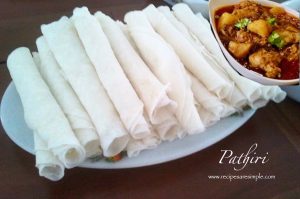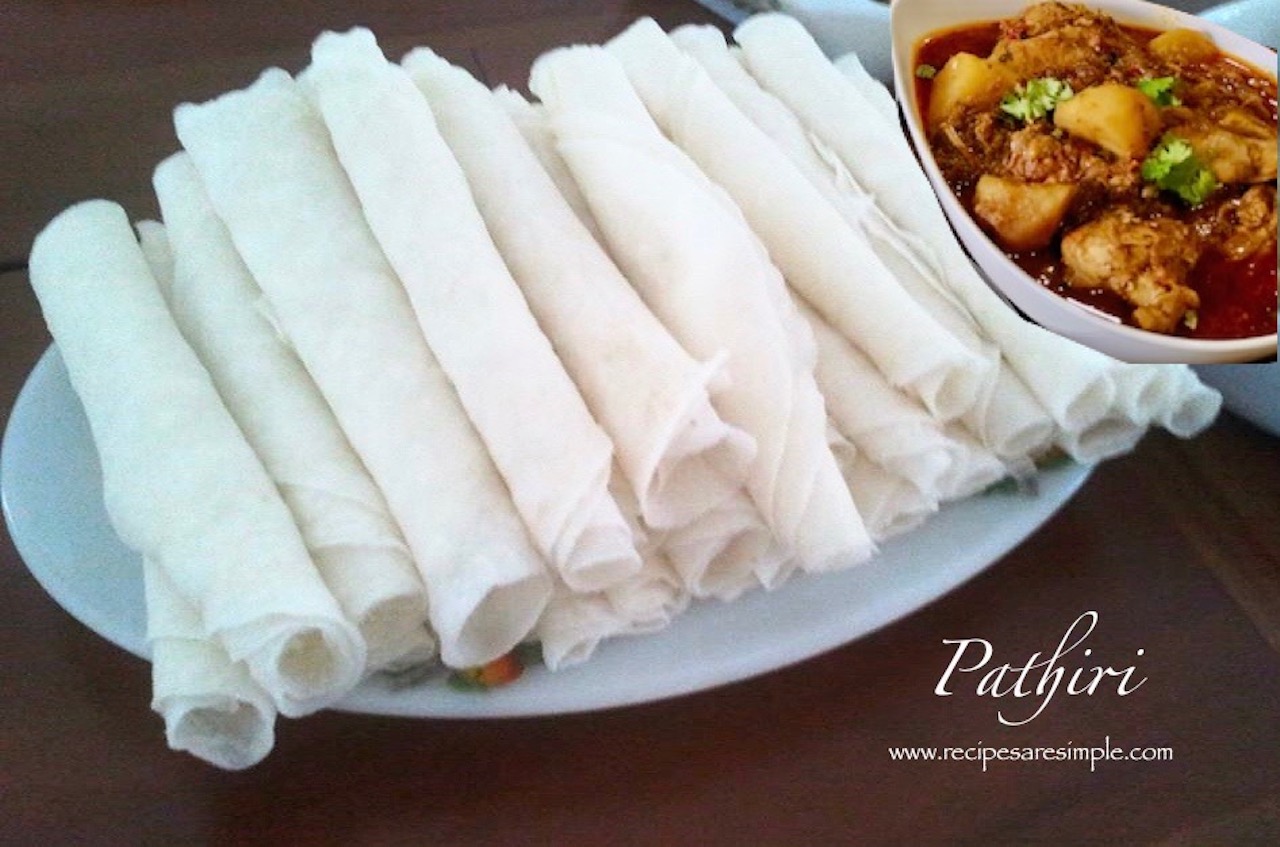Pathiri – Lightest Rice Flour Rotis Ever
The lightest and most perfect rice rotis – The Malabar Pathiri.
Pathiri is a popular Muslim dish from Kerala. These are gluten-free flatbreads made of rice flour. These Roasted Rice flour ‘Rotis’ are light and served for breakfast, lunch or dinner! Typically served with some coconut milk and a Chicken Curry Or Beef Curry! You will keep reaching for more!

Although there are several versions of Rice ROTI in India, the Malabar Pathiri stands apart. It’s so light, that when the curry is added it practically melts in your mouth. These pathiris are as ‘light as a handkerchief’. However, there is a science to making the perfect ‘light’ pathiris. It takes some practice and some knowledge, but if you follow my recipes and videos, you can make them perfectly.
In the Malabar region, it is a prestigious thing to be able to make the perfect Pathiri. I have videos in both Malayalam and English, for those who want to learn how to make perfect Malabar Pathiri.
® This is a RAS signature Recipe©
A detailed introduction, step-by-step pictures,Videos without Voiceover and in the Malayalam language available on the Intro page ⇓. Check it out or scroll down for the recipe ⇓.
|
♦Let me know if you tried – Pathiri. Please comment below. ♦You can also – Mail me your pics and testimonials 🙂 – recipesaresimple@gmail.com ♦on SOCIAL MEDIA tag me @recipesaresimple and hashtag it #recipesaresimple on any platform. Thank you so much! ♥ |
♦Quick Browse to see All Recipes by Category. ♦World Cuisines to browse recipes by Regional Cuisine.
♥Thanks for visiting www.recipesaresimple.com

Pathiri – Lightest Rice Flour Rotis Ever
Description
Pathiri is a beloved staple in Kerala Muslim cuisine, offering a taste of its rich culinary heritage.
These days, in Kerala, ready-to-eat pathiri is widely available. People are making it less than a decade ago since some practice is required. Outside of Kerala, ready-made Pathiri is less common, but the special Rice flour catered to make Pathir (Pathiri podi) is available at Kerala stores. Here is how you can make delicious, soft pathiris at home.
Ingredients:
Instructions
-
Heat the water in a wide-mouthed – heavy-based pot ‘Uruli’. Add salt. Bring to boil.
-
Add coconut milk(2 Tbsp) OR coconut oil(2 tsp). See notes.
-
Add all the flour in one heap in the center of the boiling water.
-
Do not stir. Allow the water to boil over the heap of flour.
-
Once almost all covered, Turn down the heat and stir briskly with a wooden ladle quickly to moisten the flour evenly. There should not be any patches of dry flour.
-
Once you have mixed all the flour with the water, turn off heat and cover the pot for 5 minutes. The dough will be very rough looking at this stage.
-
Now is the most important part of making pathiri : The kneading.
-
You must knead the dough while it is still hot. Use heat-proof gloves or use my method:
-
“Add all the hot flaky dough to a food-safe large plastic bag like a microwavable(steaming) zipper bag and put on your oven mitts. Now knead the dough inside the plastic bag well, by flipping over the bag and pressing for a good seven minutes. Keep checking to see if you have a smooth dough with no more chunky or white bits”.
-
Roll into lime-sized balls using the pressure of your palms till the balls are completely smooth with no cracks. Flatten slightly.
-
Make balls similarly of all the dough and keep covered.
-
Use a chapati press if you have one to press the pathiri as large as possible.
-
I find that placing flat plastic sheets/bags over both sides of the press helps to get a larger rounded pathiri.
-
Then continue to roll out with a rolling pin into a large, round pathiri as thin as possible without breaking or tearing. (Use very little rice flour for dusting- using too much will give you browned/burnt pathiri)
-
Heat a flat nonstick skillet or Tawa and place one pathiri at a time ( dust off any excess flour, first).
-
When you see tiny bubbles appearing, flip the pathiri over cook the other side for 30 seconds or so till it puffs up. Press gently with a spatula to help the ‘puffing up’ process.
-
Once the pathiri is cooked on both sides, transfer to a casserole dish, wipe off the pan to remove any flour residue and start the next one.
-
I like to roll out my ‘pathiris’ on the side as I roast them simultaneously. This keeps the pathiris from drying out which is more likely if you were to roll them all out first, and only then start roasting.
-
Pathiri is often served with coconut milk to soak the path iris and any of your favourite curries.
Note
- The videos on the Intro page, show in detail how to make these Pathiris Perfectly. Try out my method if you are new to making them. With practice, you can make them perfectly.
- Coconut oil or oil is added to the boiling water for softness. Coconut milk makes them even softer, but they must be served on the same day. If you are serving them much later, oil is better used. note that Coconut milk is 2 Tbsp whereas oil is 2 tsp.
- Roasted rice flour is best for Pathiri. Ordinary Rice flour gives a raw flavor and smell.
- Pathiri flour is also available which is specific to this recipe. Ask at specialized Indian stores.
- A wet grinder with a dough hook, a food processor with dough attachment, or a bread maker may be used (as other options) to knead the dough while still hot. Dough may be kneaded using silicone baking sheets as well or using the steamer ziplock bag as shown in the video. (Kneading while hot is essential, hence these suggestions).
- If you do not have a pathiri press you can also press the pathiris between the bottom side of two steel plates (flat).
- Key Ingredients: Roasted Rice Flour, Water, Salt.



Such a helpful recipe. I loved your video.
Hi , well explained .. have you ever used food processor to kneed the pathiri dough? Wondering if we can as the dough is so hot .. pls reply
Hi Babi. Thanks. The heat is quite intense and would probably damage a regular food processor. If you have a mixer with dough attachment, that can be used. Or a wet grinder with dough hook, this can also be used.